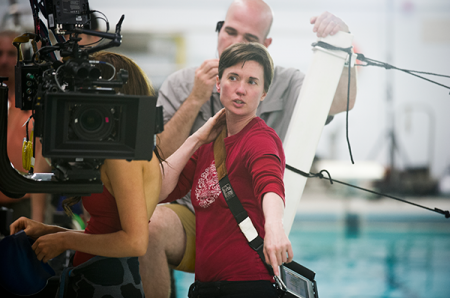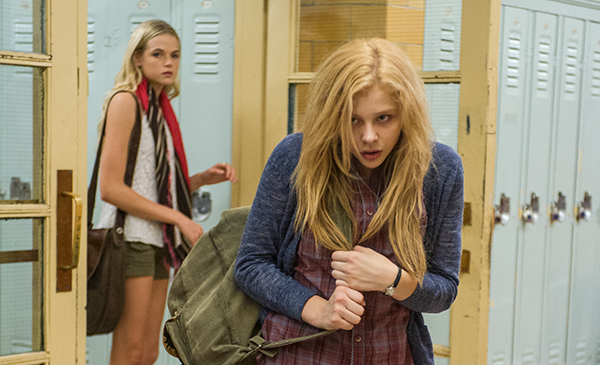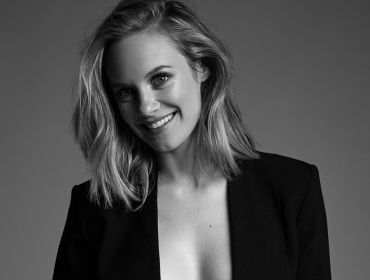SAN FRANCISCO — While most would be daunted by the task of remaking the 1974 Steven King novel and 1976 Brian De Palma film “Carrie,” a classic horror film with a cult following director Kimberley Peirce simply saw it as an opportunity. “When they came to me, the first thing I thought was I adore Brian De Palma. I think he’s a fantastic director and I love his original,” she says. So after receiving De Palma’s blessing – over a Skype call no less – and finding herself on a long flight reading the book back-to-back three times she explains, “It became really clear that I had to do this movie because of how great the Carrie White character is.” But I guess it shouldn’t come as a surprise when you look at Peirce’s background: her first film “Boys Don’t Cry” (1999), was one of the most buzzed about films that year and went on to win numerous awards including an Oscar for star Hillary Swank. Her second film “Stop-Loss” (2008) starring Ryan Phillippe and Channing Tatum, though not as commercially successful, received rave reviews.
The epicenter of the story is Carrie White, played by the darling Chloë Grace Moretz (30 Rock), is the story of a shy, awkward girl who faces torment at the hands of both the school mean girls and her religious fanatic mother (Julianne Moore), all while dealing with her newfound telekinetic powers. “Carrie is a misfit, a social outcast and what I loved was that she wanted love and acceptance … Carrie is up against these obstacles but will do anything to overcome them to get what she wants,” says Peirce. “I think it’s a wildly fun movie! I love that it’s relevant, I love that it’s from a classic, and I love that it’s more relevant than it was before. And the revenge is delicious!”
On casting Chloë Grace Moretz …
So first and foremost, what I saw was an amazing main character, this misfit-social outcast who wanted love and acceptance. What was important to me was you had to be deeply in love with Carrie. You had to walk in her footsteps. This had to be a very point-of-view movie. So I knew I needed somebody who had the warmth and the love, but then I needed somebody who could go through the transformation into a human monster. A, you needed to love her; B, you needed to want her to succeed at the prom, and you needed her to be a human monster, and when she turned and the powers come leaping at you, you needed to buy it, and then when she does the revenge tale, you still needed to be sympathetic to her. That was everything. If you ever lost your sympathy for Carrie, the movie did not work.
Chloë Moretz became my Carrie because she’s inherently charismatic – the camera loves her, she’s been acting since she was five, she knows her instrument. She’s very physically able, and I knew that she could carry the movie because of her amount of charisma. So I sat down with her and I said ‘you’re amazing, but look at you … you’re so confident, you’ve got a family that loves you … and you’re a total professional, and you live on the world’s stage. You could not be farther from Carrie White. It’s imperative that we get rid of your confidence, that we make you fragile … you have to be a broken young woman.’ And she was like ‘Kim, I will do anything you want.’
Casting Julianne Moore …
Now there’s Margaret White. Think about it, this is a woman who loves her daughter but feuds with her daughter because she thinks her daughter is evil, thinks her daughter has evil powers, and feels that her daughter has exposed, essentially the fact that she had sex and enjoyed it. So she’s at odds with her daughter. She also is a woman who doesn’t like to leave the house because she’s scared of the outside world. She uses corporal punishment on her daughter, but actually as Julianne will tell you, uses it even more on herself – doesn’t want to hit her daughter, would rather hurt herself. Which really, we made great inroads in the movie. I needed to bring this woman to life. Julianne was the only person who could play that role because she’s such a brilliant actress. She is one of our greatest living actresses. She is warm, she is sensual, she is sexual, she is beautiful, she is a consummate professional.
Directing someone to have telekinesis powers …
Telekinesis was hugely important. She’s turning to it to save herself. So for me it was about making telekinesis part of her and was something she was actively living. From the very beginning she wants it. She explores it. So I not only worked with Chloë to come up with in her body, how the telekinesis worked. I always grounded the telekinesis in physics. I was looking at the atomic bomb explosions and the way the energy moves out and we always said that’s how it was. The telekinesis moved the way emotional energy moved. We made sure that everything was physically bound in her body and then worked in the physical world.

A few of Peirce’s favorite things about the story …
I loved that there was a Cinderella story component. She wants to wear the beautiful dress, she wants to go to the ball, she wants to dance with the handsome boy and she wants to have that magical night. That to me is fantastic. You fall in love with that, even though you know that she shouldn’t do that.
I [also] saw it as a superhero origin story and that was really exciting to me. And look maybe that’s because we’ve had the benefit of all the great Marvel comic magazine movies, we’ve had great characters, great actors play these roles. But these are real stories … What I loved was that the superpowers were part of Carrie’s identity. They were part of her survival. So if you’re a misfit and you can’t fit into the social spectrum, and you’re lonely and you can’t get love and support at home and you find that you have a talent. Write, if you guys can write, direct, photograph, if you’re good at business; whatever your talent is, that’s your mode of survival. That’s what the powers were for her. It was an opportunity to survive and be ok in the world.
“This is the story of the misfit, because we’re all misfits.”
To me, this is a good old-fashioned revenge tale and the way to make a revenge tale work, it was imperative that we loved Carrie White. You had to love her, you had to identify with her, you had to want to see the Cinderella story go well, you had to feel excitement when it did go well, But you had to know that Chris Hargensen (Portia Doubleday) had it out for Carrie and she was going to take it all away. And when she took it away, and you watched it be taken away, you had to feel a level of anger. You had to feel a sense of injustice and you had to want Carrie to pull those super powers out and to go after the people that did this to her. There was an equation to the entertainment: we had to make sure we were inside Carrie’s footsteps ever step of the way. This is the story of the misfit, because we’re all misfits. On some level, human dynamics are always shifting and I think we’re always misfits on some level, somewhere.
Telling a classic story when bullying with violent consequences has become modern reality …
We don’t want to go to the movies and see the headlines play out at the movie theater. We have the news for that. I think that movies are a level of escapism, we want to go and we want to be entertained. We want to have fun with the vengeance story; we don’t want to be weighed down by it. So my goal in service to King was to make this wildly entertaining movie. But at the same time, I think if a movie is completely divorced from the reality of the current day and the issues, then it has no weight to it. So it’s a very interesting thing … you want to make a wildly entertaining movie that allows you to have fun with the revenge tale. But because there’s a level of justice you feel good about it. But at the same time you want it to be touching the issues of the day so you feel like, ‘you know what, there’s meaning there. I cared about it.’ I think that’s a real interesting challenge a director goes through. You want it to rise to the level of myth and metaphor. I’m trying to take you on a really fun journey that has truth to it.
Check out our review of the film
(Images courtesy of Sony Pictures)





